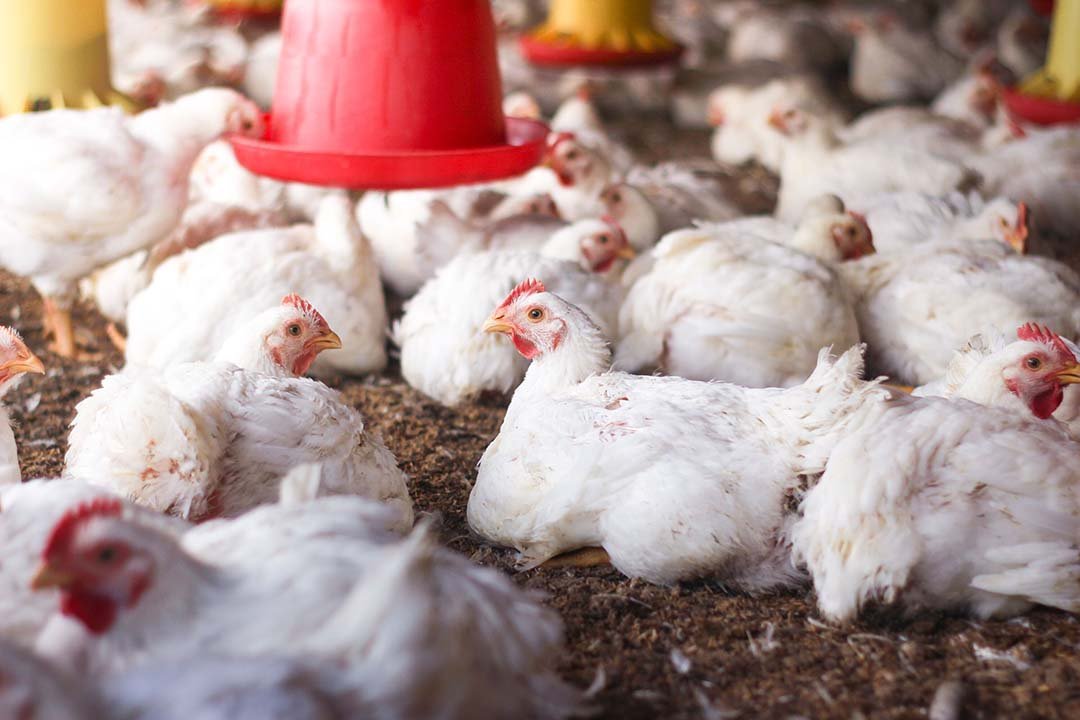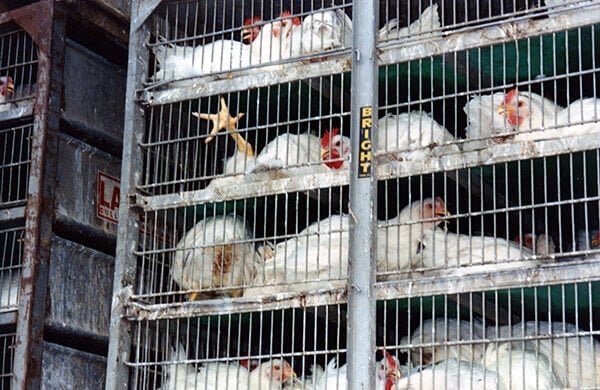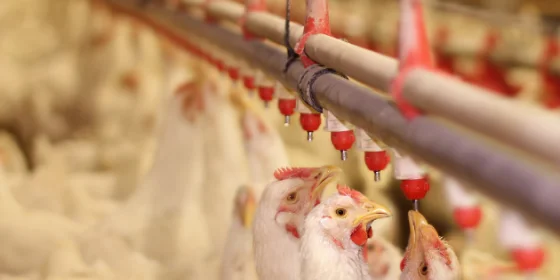In today’s poultry farming, the welfare of broiler chickens is key. These chickens are raised for meat and are a big part of the poultry industry. It’s not just right to treat them well; it’s also good for the planet and for doing things right.
This article talks about how to treat broiler chickens right. It covers their whole life, from where they live to how they’re fed and handled. It also looks at how they’re moved and killed.
Key Takeaways
- Broiler chicken welfare is a crucial aspect of modern poultry farming, ensuring ethical and sustainable production.
- The article covers key elements of broiler chicken welfare, including housing conditions, nutrition, handling, transportation, and slaughter methods.
- Regulatory bodies and industry guidelines play a vital role in establishing and enforcing animal welfare standards for broiler chickens.
- Responsible and sustainable broiler farming practices prioritize the well-being of the animals while also meeting consumer demand.
- Understanding the ethical considerations and future trends in broiler production is essential for advancing humane practices in the industry.
Introduction to Broiler Chicken Welfare
Broiler chickens are key in the global food system. But their welfare is a big concern. People, regulators, and animal advocates are all watching closely. It’s important to know about animal welfare standards for broiler chickens for ethical and sustainable farming.
Importance of Animal Welfare in Poultry Farming
Animal welfare is key in modern poultry farming. It shows how animals are treated and affects the industry’s future. Better broiler chicken welfare means healthier animals and better products. It also meets consumer demands for sustainable and responsible farming.
Overview of Broiler Chicken Production
The broiler chicken production process has many stages, from hatchery to slaughter. Each stage has its own welfare concerns. Broiler chickens live in controlled indoor spaces, where their housing, food, and environment greatly affect their well-being. Knowing these details is essential for setting and enforcing animal welfare standards for broiler chickens.
Broiler Housing Conditions
It’s important to make sure broiler chickens have good housing. This is key for their health and humane treatment. The right housing helps these birds stay healthy and comfortable during their growth and production.
Stocking density is a big factor in broiler housing. Too many birds in a small space can cause stress and poor air. quality It’s better to have enough space for each bird to move and act naturally.
Lighting is also crucial. The right light and dark balance helps the birds’ natural rhythms. Good ventilation and temperature control keep the environment healthy and comfortable for the broilers.
| Housing Condition | Importance |
|---|---|
| Stocking Density | Ensuring sufficient space for natural behaviors and reducing stress |
| Lighting | Supporting natural circadian rhythms and reducing stress |
| Ventilation and Temperature | Maintaining a comfortable and healthy environment |
By focusing on broiler housing, farmers can treat these birds humanely. This improves their well-being during the production process.
“Providing broiler chickens with a comfortable and stress-free environment is essential for their welfare and the quality of the final product.”
Understanding Animal Welfare Standards for Broiler Chickens
Keeping broiler chickens healthy is key to responsible farming. Rules and guidelines help make sure they are treated well. Let’s look at the main groups and signs that show how well broiler chickens are cared for.
Regulatory Bodies and Guidelines
In the United States, the USDA looks after broiler chicken welfare. The USDA’s Animal Welfare Act and the Humane Slaughter Act set rules for their care. The American Humane Association and the Global Animal Partnership also offer programs that go beyond these rules.
Key Welfare Indicators
- Physical Health: Checking for injuries, diseases, and lameness is important for their health.
- Behavioral Expression: Seeing if they can do natural things, like foraging and dust-bathing,g shows their well-being.
- Affective States: Their emotional health, like not being scared or stressed, is also key.
Knowing the rules and focusing on these signs helps farmers raise broiler chickens the right way.
“The true measure of a society is how it treats its most vulnerable members.”
Broiler Nutrition and Feeding
Proper nutrition is ketoor broiler chickens’ health and growth. They need a mix of proteins, carbs, fats, vitamins, and minerals. Knowing these broiler nutrition requirements helps ensure they perform well.
Nutritional Requirements
Broiler chickens need specific nutrients as they grow. These include:
- High-quality protein for muscle development
- Carbohydrates for energy
- Fats for energy and insulation
- Vitamins and minerals for health and immune function
It’s important to balance these broiler nutrition requirements forthe best growth and performance.
Feeding Practices
Broiler feeding practices vary to meet their nutritional needs. These include:
- Multi-phase feeding: Changing feed as birds grow
- Precision feeding: Customizing feed for each flock or bird
- Ad-libitum feeding: Giving birds constant access to feed
- Supplementation: Adding vitamins and minerals to feed
Good broiler feeding practices improve growth, feed efficiency, and health. This leads to successful broiler production.
| Nutrient | Broiler Starter | Broiler Grower | Broiler Finisher |
|---|---|---|---|
| Crude Protein | 23% | 20% | 18% |
| Metabolizable Energy | 3,200 kcal/kg | 3,150 kcal/kg | 3,100 kcal/kg |
| Calcium | 1.0% | 0.9% | 0.8% |
| Available Phosphorus | 0.45% | 0.40% | 0.35% |
The specific broiler nutrition requirements and broiler feeding practices are vital. They help keep broiler chickens healthy and productive throughout their growth cycle.
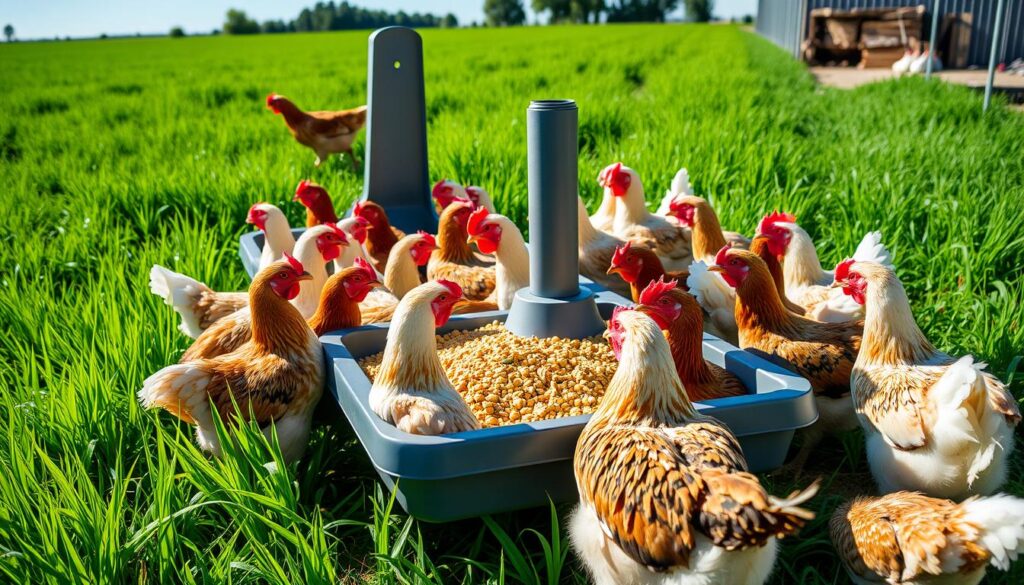
Humane Handling and Transportation
It’s very important to handle and transport broiler chickens humanely. Moving them from farms to processing facilities can be stressful. It’s crucial to do it carefully to avoid harming them.
When loading and unloading chickens, poultry handlers must be trained in gentle handling techniques. This helps reduce stress and prevent injuries. Using the right equipment, like crates and conveyors, is also key.
The condition of the vehicles matters a lot. Well-designed trucks with good ventilation, temperature control, and enough space help keep the birds comfortable. Planning the route and schedule can also make the trip less stressful for the chickens.
In recent years, the industry has improved how it transports broiler chickens. Technologies like real-time monitoring systems and GPS tracking help keep an eye on the birds during transport. Research and teamwork between farmers, transporters, and regulators are driving these improvements.
“The humane treatment of broiler chickens during transportation is not just a moral imperative, but also a critical component of responsible and sustainable poultry farming.”
By focusing on the comfort and well-being of broiler chickens during transport, the poultry industry shows it cares. This not only helps the birds but also builds trust with consumers. It also improves the industry’s reputation.
Broiler Slaughter Methods
The poultry industry’s final step is the slaughter of broiler chickens. This stage is critical for animal welfare. It focuses on stunning and killing procedures.
Stunning and Killing Procedures
The stunning process makes chickens unconscious before they are killed. This is done through electrical or gas stunning. Electrical stunning uses an electric current, while gas stunning uses gases like carbon dioxide.
After stunning, chickens are killed by neck cutting or decapitation. These methods need to be done carefully to ensure a quick and painless death.
Minimizing Suffering
The poultry industry works hard to minimize suffering in broiler slaughter. They follow broiler slaughter protocols closely. This includes training and monitoring staff and strict quality control.
Research and new technology aim to make slaughter more humane. This helps reduce distress and suffering in chickens.
“The welfare of animals is a matter of public concern, and animal suffering should be minimized during all stages of the production process, including slaughter.”
Environmental Enrichment for Broilers
In modern poultry farming, the health of broiler chickens is key. Environmental enrichment is a new way to improve their lives. It makes their living space more interesting and natural, helping their health and happiness.
There are many ways to enrich a broiler’s environment. Adding perches and dust baths are just a few. These activities let the birds do what comes naturally, like roosting and foraging.
- Perches: Letting broilers perch helps their health and prevents leg problems.
- Dust Baths: Dust baths help keep their feathers clean and free of parasites.
- Foraging Opportunities: Foraging materials make the birds more active and less bored.
By adding these features, farmers can make a better home for broilers. This leads to better health, less stress, and more natural behavior. It’s good for the birds and the farmers who care about them.
“Enriching the environment of broiler chickens is not just a matter of compliance, but a responsibility to ensure their well-being and promote sustainable farming practices.”
As farming changes, so will the care for broiler chickens. Environmental enrichment will become more important. It will help both the animals and the farmers who treat them right.
Ethical Considerations in Broiler Production
The poultry industry is changing, and how we treat broiler chickens is a big issue. The debate between animal rights and welfare has shaped how we treat these birds.
Animal Rights vs Animal Welfare
Animal rights groups want to stop all animal exploitation. They believe animals have inherent rights. On the other hand, animal welfare focuses on treating animals humanely, even in food production.
Animal welfare groups aim to improve broiler chicken lives. They want better housing, food, handling, and slaughter methods. This ensures the birds’ needs are met.
Sustainable and Responsible Farming
The industry is working on sustainable and responsible broiler farming. It aims to reduce environmental harm, improve animal welfare, and keep farming viable.
It’s adopting sustainable practices like recycling waste and using feed efficiently. It also promotes biodiversity. This balances economic needs with animal and environmental well-being.
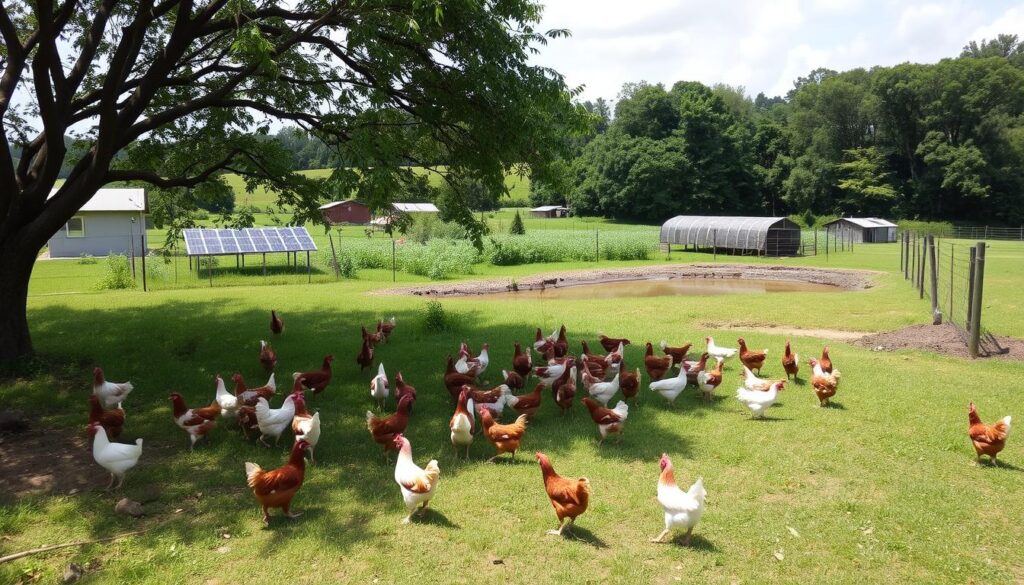
As people learn more about their food choices, the poultry industry must keep improving. It needs to address ethical concerns to keep public trust and ensure broiler production’s future.
Consumer Awareness and Labeling
The poultry industry is changing fast. People want to know more about how chickens are treated. This is because they want to buy products that match their values.
Labels on broiler chicken products are becoming key. They tell us about the chickens’ living conditions and how they are raised. This lets consumers make choices that help improve animal welfare.
| Certification Scheme | Key Welfare Indicators |
|---|---|
| Certified Humane |
|
| Animal Welfare Approved |
|
As more people learn about broiler chicken welfare, they want labels. This change can push the industry to treat chickens better. It encourages producers to improve the lives of broiler chickens.
“Informed consumers can be a powerful force for change in the poultry industry. By understanding the impact of their purchasing decisions, they can shape a more ethical and sustainable future for broiler chickens.”
Future Trends and Innovations
The broiler chicken industry is always changing, focusing on better animal care. As more people want chicken from farms that treat animals well, new ideas are coming up. These ideas aim to change the way we raise and produce broiler chickens.
One big change is using smart sensors in chicken houses. These sensors watch things like temperature, humidity, air quality, and light. This helps farmers keep their chickens happy and healthy by fixing problems fast.
Scientists are also working on better food for chickens. They’re making special diets that meet chickens’ needs. This helps chickens grow strong and healthy, while keeping animal welfare in mind.
The industry is working with governments to make rules for better chicken care. This teamwork makes sure animal welfare stays important as the industry grows and changes.
“As we look to the future, the broiler industry is poised to deliver even greater advancements in animal welfare, fueled by a steadfast commitment to innovation and continuous improvement.”
The broiler industry is leading the way in new ideas for chicken care and production. By adopting these changes, farmers can meet the demand for chicken from farms that care about animals. This also sets a new standard for animal welfare in the industry.
In this article, we’ve looked closely at animal welfare in the broiler chicken industry. We’ve covered broiler housing, nutrition, handling, transportation, and slaughter. This helps us understand how the industry works to raise these birds humanely and responsibly.
We’ve talked about the role of rules and guidelines in animal welfare. We’ve also discussed important welfare signs that show how well the industry is doing. The article also touched on the ethics of animal rights and welfare. It stressed the need for farming that is good for the planet, people, and animals.
As more people want to know about where their food comes from, the broiler industry must keep improving. By using new ideas and technology, the industry can make life better for chickens. This will also help build trust with customers who care about animal welfare.
FAQ
What are the key animal welfare standards for broiler chickens?
The main animal welfare standards for broiler chickens cover housing, nutrition, handling, and slaughter. These rules help ensure chickens are treated humanely from start to finish.
How do regulatory bodies and guidelines shape animal welfare in the broiler industry?
Groups like the USDA and the American Humane Association set rules for broiler chicken care. These guidelines help make sure chickens are raised ethically and responsibly.
What are the essential nutritional requirements for broiler chickens?
Broiler chickens need a balanced diet for growth and health. This includes proteins, carbs, fats, vitamins, and minerals. Good feeding practices are key to their well-being.
How are broiler chickens transported and handled in a humane manner?
Transporting chickens humanely involves gentle handling and proper crates. The industry is always looking to improve these methods to keep birds safe and stress-free.
What are the key considerations in broiler slaughter protocols?
Slaughter protocols aim to reduce suffering in chickens. This includes proper stunning and killing, following strict guidelines for animal welfare.
How does environmental enrichment benefit broiler chickens?
Environmental enrichment boosts chickens’ physical and mental health. It includes things like perches and dust baths in their housing. These help them behave naturally and reduce stress.
What are the ethical considerations in broiler chicken production?
Ethical concerns in chicken production involve animal rights and welfare. The industry is working to balance these and promote sustainable farming.
How can consumers make informed choices about broiler chicken welfare?
Consumers can choose better by looking at labels and certifications. These show whether the chicken was raised under good animal welfare standards. This helps support better farming practices.


